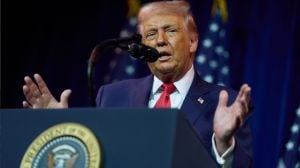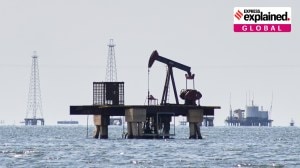October Revolution, 2003
How many in this century remember V I Lenin? Lenin believed and declared that two 8216;E8217;s were imperative for the building of a moder...

How many in this century remember V I Lenin? Lenin believed and declared that two 8216;E8217;s were imperative for the building of a modern and a mighty state 8212; Education and Electricity. He was absolutely right. Though communism collapsed by the end of the last century, the Soviet Union or Russia remains a political power. I was told that even during the crisis years, the school system and the supply of electricity did not break down.
Developing countries face multiple challenges. The most formidable challenge is the presence of a handful of countries that are economic power houses and have the capacity to impose their will on the developing countries. Cancun was an example: it is a tribute to the developing countries that they did not bend or buckle under pressure. However there were no winners. Cancun simply highlighted the fact that we live in an unequal and cruel world.
For a developing country like India, it must acquire the muscle and strength to challenge 8212; or at least do business on fair terms with 8212; the entrenched economic powers. Like Education and Electricity, what are the new imperatives for building a modern state? Any list would still leave Education and Electricity at the top. And to those must be added what I would call the four 8216;I8217;s 8212; Infrastructure, Investment, Information Technology and International Trade.
Our education system is still in a mess. We may have some of the best schools in the world, but we also have a large proportion of the worst schools in the world. A typical primary school in a small village in one of the backward districts of any State in India will be the following: single teacher, sans library, sans lavatory, and sans community participation. The absence rate of teachers in primary schools varies from 15 percent in Gujarat to 39 percent in Bihar.
Our electricity sector is also in a shambles. About 27 percent of all electricity produced is 8216;8216;lost8217;8217;. Both subjects, Education and Electricity, require separate treatment. My focus in this article is on the other four imperatives and to explain, briefly and within the space available, why each one of them is crucial to rapid development.
Infrastructure is a catch-all word. Given the context and stage of India8217;s development, the infrastructure imperative begins with road and rail. The condition of our road and rail networks have, instead of improving, deteriorated over the years. While the golden quadrilateral and the north-south, east-west corridors are ambitious programmes, they also shine in contrast with the parlous state of the roads within a State, especially roads that connect the villages. The culprit is the Public Works Department. If all the money that has been spent by all the PWDs over the last 50 years is added up, we should have built roads of twice the length that we have today and of a quality that rivals the roads of Germany and the US. The same goes for our rail network. Just add up the crores of rupees that have been spent over the last 50 years. What is there to show in terms of better rails, higher safety, better carriages or faster travel? The Indian railway system is at least thirty years behind comparable systems in France or Japan.
The next imperative is Investment. If you want a slogan here it is: 8216;8216;Invest or perish8217;8217;. States like Bihar and Orissa are on the verge of perishing because of lack of investment. It is aggregate investment that has pushed up the growth rate in one of the more advanced states of India like Karnataka. At the disaggregated level; the lack of investment in the crucial power sector has inflicted a high cost on Karnataka. The lesson to be drawn is that India must sharply increase its investment expenditure as a proportion of total expenditure and the investment must flow into crucial areas where there is a huge gap between the resources needed and the resources available.
In earlier columns I have argued for rejecting the phobia about 8216;8216;foreign8217;8217; money. I wish to make another controversial suggestion. Perhaps, for a certain period of time, we should be colour blind to 8216;8216;black8217;8217; money if invested in certain sectors. Consider tourism. That is one sector which has almost infinite potential. Every additional tourist who comes to India has the potential to create at least two additional jobs. Can we not agree on a policy that allows for a period of ten years8217; new investment in the tourism sector 8212; hotels, luxury coaches, spas and treatment centres, sports facilities for skiing, sailing, surfing, hiking, mountaineering and golf 8212; and promises that no questions will be asked about the source of funds? Agreed, there is an element of inequity in this proposal and the means are somewhat dishonest, but this is perhaps one of the better examples where the ends would justify the means.
The third imperative is Information Technology. It is a tool for governance. Its value lies in its capacity to enhance efficiency, quality and speed. Corporates have realised its value. But nowhere is it more important than in government. Why is government essentially antagonistic to the use of Information Technology? Because government tends to guard information, IT believes in disseminating and sharing information. Government works on a vertical and hierarchical model, whereas IT has the capacity to create a horizontal and egalitarian network for decision making. The primary function of government is the delivery of public goods and services, and IT can bring about a revolutionary change in this behalf. Yet governments are loath to adopting IT in a big way. The use of IT must find a place in the minimum programmes of the governments when they assume office.
The fourth imperative is International Trade. India8217;s attitude to International Trade is ambivalent. We seem to have less faith in the WTO than in Free Trade Agreements FTA and Regional Trading Agreements RTA. FTAs and RTAs are useful but have severe limits. At best, they are building blocks. Besides, FTAs will extract a price. The proposed Indo-ASEAN FTA will not be launched unless India agrees to bring its tariffs on par with ASEAN tariffs. The better course appears to be to renew our faith in the WTO and work towards reaching global agreements.
Having said all this, I wish to add that the most demanding imperative is that we devote sufficient time and attention to the four imperatives for building a modern and strong nation.
Write to the author at pcexpressindia.com
- 01
- 02
- 03
- 04
- 05































